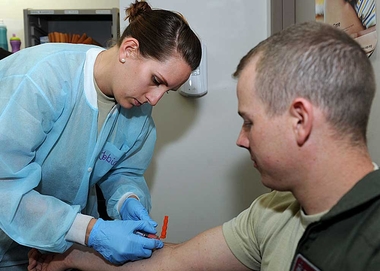Adolescent lesson

By Mary Turner
HIV/AIDS Health Columnist
Adolescent: (of a young person) in the process of developing from a child into an adult; an adolescent boy or girl (Google, 2016). Adolescent: a person appearing adult-like in stature, but harboring often child-like qualities including, but not limited to, immature brain development; a teenager who firmly believes, “It won’t happen to me.” (Mary Turner, 2016).
Let me be clear up front and tell you that I love adolescents. I trained to work with them years ago as a high school teacher, and I continued to study them and marvel at their behaviors as I moved into higher education to teach psychology.
Typically, I have at least one high school student - adolescent - in each of my classes each semester. For all the challenges they may present, I still find them fun to work with. With that said, I also feel the need from time to time to lay my hands on their sweet little faces and have a come-to-Jesus moment with them.
Because their brains are still developing and learning how to make wise choices, because they often walk around with an “It won’t happen to me attitude,” and because the adults in their lives (parents, teachers, and others) are too uncomfortable to broach the topic of safer sex, individuals between the ages of 13 and 24 account for 26 percent of new HIV infections each year. (These ages most typically encompass adolescence and extended adolescence).
When hormones awaken, we get frisky, we get curious, we experiment with drugs and alcohol, and we take unnecessary risks. The reason there are so many old virgins in the South is that as long as we don’t talk about it, it didn’t happen. So our kids don’t talk about it, at least not with us.
Sex is a scary topic, and we certainly don’t want our kids to question us about when we lost our virginity or how many people we have had sex with or what is the craziest thing we have ever done with another person. It’s easier for us not to ask questions, and it’s easier for them not to risk the lectures or rejection of their parents, teachers, youth leaders, etc.
So, more than one-fourth of new HIV infections are laid on the shoulders of our adolescents. Of those who are infected each year, a disproportionate number (57 percent) are black followed by 20 percent for Hispanic/Latino and Caucasian. Adult involvement and support could go a long way in reducing those numbers.
What’s worse is that only about 13 percent of these sexually active youngsters have ever been tested. We know that prevention is the best policy. We also know that early testing and diagnosis are key to controlling the virus early and helping insure that the person has a good quality of life. People who get tested and know their status tend to be more in control of their decision-making, even with those immature brains, than those who do not get tested.
If you are a parent, I strongly urge you to set aside your fear and discomfort and talk with your child about sex and how to protect himself/herself from infection. If you are a grandparent, aunt, uncle, teacher, or other person who may work with young people, make yourself available to listen and offer guidance if an adolescent wants to talk to you. If you are an adolescent who is sexually active or plan to be sexually active, find the courage to speak with a responsible adult about your situation.
If you don’t have one of those in your life, find a phone and call the AIDS/HIV Hotline for your state. One beautiful thing about being young is living to be old and reminiscing about when you were young.
Don’t let HIV take that opportunity away from you.
State AIDS/HIV Hotlines
Arkansas - (800) 232-4636
Kansas - (785) 296-6174
Missouri - (866) 628-9891
Oklahoma - (800) 535-2437 (Se Habla Espanol (800) 344-7432
Texas - (800) 299-2437
The Gayly- 3/28/2016 @ 10:44 AM CST





